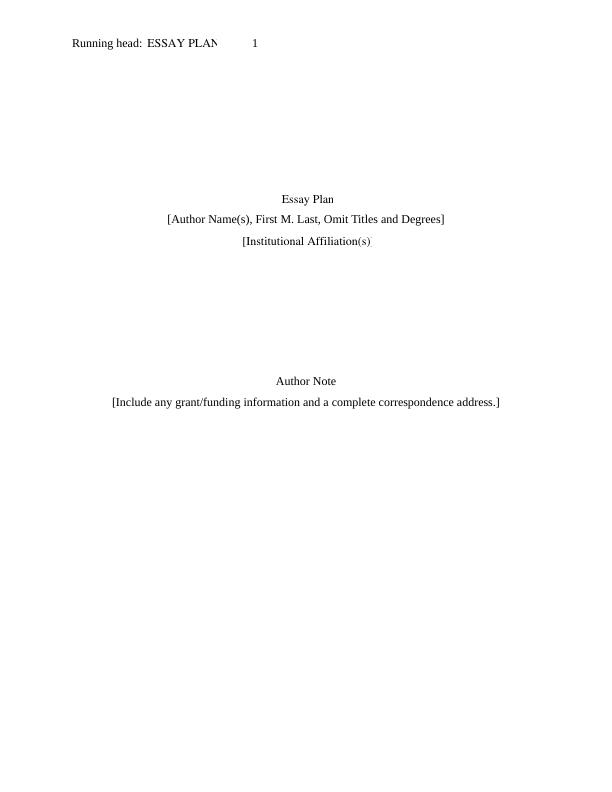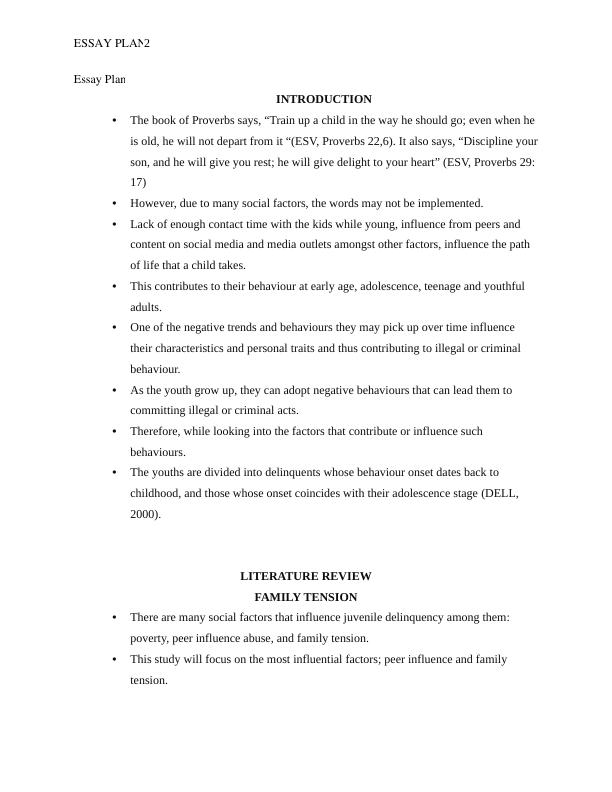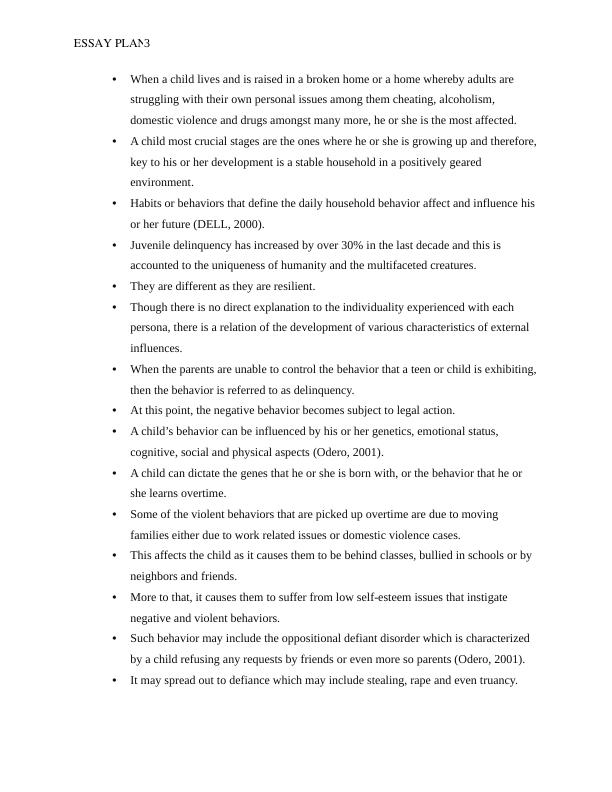Factors Influencing Juvenile Delinquency: Peer Influence and Family Tension
Added on 2023-06-10
7 Pages1669 Words246 Views
Running head: 1
[Author Name(s), First M. Last, Omit Titles and Degrees]
Author Note
[Include any grant/funding information and a complete correspondence address.]
[Author Name(s), First M. Last, Omit Titles and Degrees]
Author Note
[Include any grant/funding information and a complete correspondence address.]

2
INTRODUCTION
• The book of Proverbs says, “Train up a child in the way he should go; even when he
is old, he will not depart from it “(ESV, Proverbs 22,6). It also says, “Discipline your
son, and he will give you rest; he will give delight to your heart” (ESV, Proverbs 29:
17)
• However, due to many social factors, the words may not be implemented.
• Lack of enough contact time with the kids while young, influence from peers and
content on social media and media outlets amongst other factors, influence the path
of life that a child takes.
• This contributes to their behaviour at early age, adolescence, teenage and youthful
adults.
• One of the negative trends and behaviours they may pick up over time influence
their characteristics and personal traits and thus contributing to illegal or criminal
behaviour.
• As the youth grow up, they can adopt negative behaviours that can lead them to
committing illegal or criminal acts.
• Therefore, while looking into the factors that contribute or influence such
behaviours.
• The youths are divided into delinquents whose behaviour onset dates back to
childhood, and those whose onset coincides with their adolescence stage (DELL,
2000).
LITERATURE REVIEW
FAMILY TENSION
• There are many social factors that influence juvenile delinquency among them:
poverty, peer influence abuse, and family tension.
• This study will focus on the most influential factors; peer influence and family
tension.
INTRODUCTION
• The book of Proverbs says, “Train up a child in the way he should go; even when he
is old, he will not depart from it “(ESV, Proverbs 22,6). It also says, “Discipline your
son, and he will give you rest; he will give delight to your heart” (ESV, Proverbs 29:
17)
• However, due to many social factors, the words may not be implemented.
• Lack of enough contact time with the kids while young, influence from peers and
content on social media and media outlets amongst other factors, influence the path
of life that a child takes.
• This contributes to their behaviour at early age, adolescence, teenage and youthful
adults.
• One of the negative trends and behaviours they may pick up over time influence
their characteristics and personal traits and thus contributing to illegal or criminal
behaviour.
• As the youth grow up, they can adopt negative behaviours that can lead them to
committing illegal or criminal acts.
• Therefore, while looking into the factors that contribute or influence such
behaviours.
• The youths are divided into delinquents whose behaviour onset dates back to
childhood, and those whose onset coincides with their adolescence stage (DELL,
2000).
LITERATURE REVIEW
FAMILY TENSION
• There are many social factors that influence juvenile delinquency among them:
poverty, peer influence abuse, and family tension.
• This study will focus on the most influential factors; peer influence and family
tension.

3
• When a child lives and is raised in a broken home or a home whereby adults are
struggling with their own personal issues among them cheating, alcoholism,
domestic violence and drugs amongst many more, he or she is the most affected.
• A child most crucial stages are the ones where he or she is growing up and therefore,
key to his or her development is a stable household in a positively geared
environment.
• Habits or behaviors that define the daily household behavior affect and influence his
or her future (DELL, 2000).
• Juvenile delinquency has increased by over 30% in the last decade and this is
accounted to the uniqueness of humanity and the multifaceted creatures.
• They are different as they are resilient.
• Though there is no direct explanation to the individuality experienced with each
persona, there is a relation of the development of various characteristics of external
influences.
• When the parents are unable to control the behavior that a teen or child is exhibiting,
then the behavior is referred to as delinquency.
• At this point, the negative behavior becomes subject to legal action.
• A child’s behavior can be influenced by his or her genetics, emotional status,
cognitive, social and physical aspects (Odero, 2001).
• A child can dictate the genes that he or she is born with, or the behavior that he or
she learns overtime.
• Some of the violent behaviors that are picked up overtime are due to moving
families either due to work related issues or domestic violence cases.
• This affects the child as it causes them to be behind classes, bullied in schools or by
neighbors and friends.
• More to that, it causes them to suffer from low self-esteem issues that instigate
negative and violent behaviors.
• Such behavior may include the oppositional defiant disorder which is characterized
by a child refusing any requests by friends or even more so parents (Odero, 2001).
• It may spread out to defiance which may include stealing, rape and even truancy.
• When a child lives and is raised in a broken home or a home whereby adults are
struggling with their own personal issues among them cheating, alcoholism,
domestic violence and drugs amongst many more, he or she is the most affected.
• A child most crucial stages are the ones where he or she is growing up and therefore,
key to his or her development is a stable household in a positively geared
environment.
• Habits or behaviors that define the daily household behavior affect and influence his
or her future (DELL, 2000).
• Juvenile delinquency has increased by over 30% in the last decade and this is
accounted to the uniqueness of humanity and the multifaceted creatures.
• They are different as they are resilient.
• Though there is no direct explanation to the individuality experienced with each
persona, there is a relation of the development of various characteristics of external
influences.
• When the parents are unable to control the behavior that a teen or child is exhibiting,
then the behavior is referred to as delinquency.
• At this point, the negative behavior becomes subject to legal action.
• A child’s behavior can be influenced by his or her genetics, emotional status,
cognitive, social and physical aspects (Odero, 2001).
• A child can dictate the genes that he or she is born with, or the behavior that he or
she learns overtime.
• Some of the violent behaviors that are picked up overtime are due to moving
families either due to work related issues or domestic violence cases.
• This affects the child as it causes them to be behind classes, bullied in schools or by
neighbors and friends.
• More to that, it causes them to suffer from low self-esteem issues that instigate
negative and violent behaviors.
• Such behavior may include the oppositional defiant disorder which is characterized
by a child refusing any requests by friends or even more so parents (Odero, 2001).
• It may spread out to defiance which may include stealing, rape and even truancy.

End of preview
Want to access all the pages? Upload your documents or become a member.
